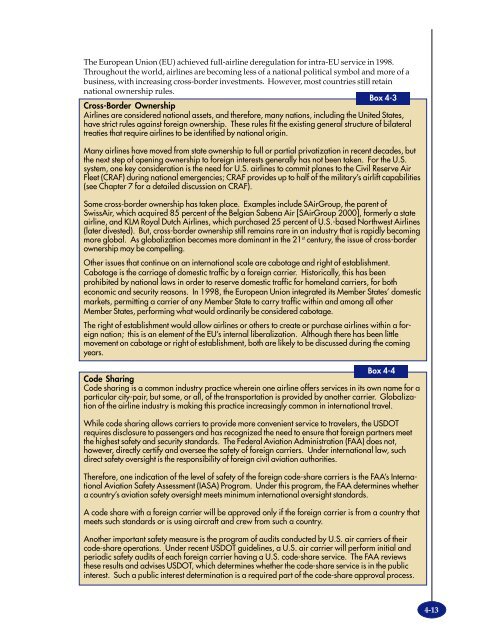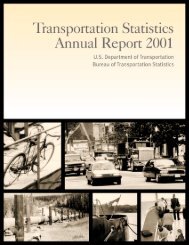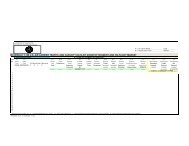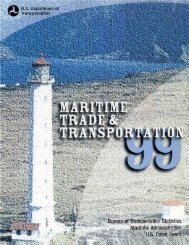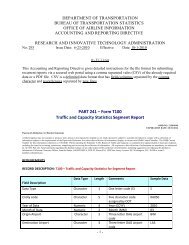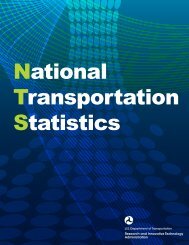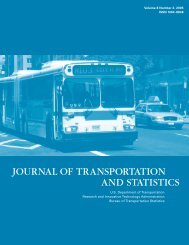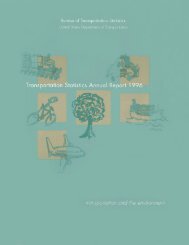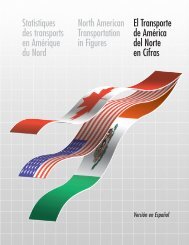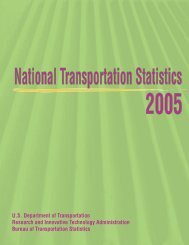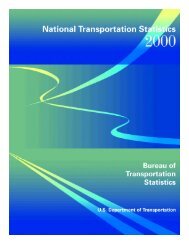TRANSPORTATION - BTS - Bureau of Transportation Statistics
TRANSPORTATION - BTS - Bureau of Transportation Statistics
TRANSPORTATION - BTS - Bureau of Transportation Statistics
You also want an ePaper? Increase the reach of your titles
YUMPU automatically turns print PDFs into web optimized ePapers that Google loves.
The European Union (EU) achieved full-airline deregulation for intra-EU service in 1998.Throughout the world, airlines are becoming less <strong>of</strong> a national political symbol and more <strong>of</strong> abusiness, with increasing cross-border investments. However, most countries still retainnational ownership rules.Box 4-3Cross-Border OwnershipAirlines are considered national assets, and therefore, many nations, including the United States,have strict rules against foreign ownership. These rules fit the existing general structure <strong>of</strong> bilateraltreaties that require airlines to be identified by national origin.Many airlines have moved from state ownership to full or partial privatization in recent decades, butthe next step <strong>of</strong> opening ownership to foreign interests generally has not been taken. For the U.S.system, one key consideration is the need for U.S. airlines to commit planes to the Civil Reserve AirFleet (CRAF) during national emergencies; CRAF provides up to half <strong>of</strong> the military’s airlift capabilities(see Chapter 7 for a detailed discussion on CRAF).Some cross-border ownership has taken place. Examples include SAirGroup, the parent <strong>of</strong>SwissAir, which acquired 85 percent <strong>of</strong> the Belgian Sabena Air [SAirGroup 2000], formerly a stateairline, and KLM Royal Dutch Airlines, which purchased 25 percent <strong>of</strong> U.S.-based Northwest Airlines(later divested). But, cross-border ownership still remains rare in an industry that is rapidly becomingmore global. As globalization becomes more dominant in the 21 st century, the issue <strong>of</strong> cross-borderownership may be compelling.Other issues that continue on an international scale are cabotage and right <strong>of</strong> establishment.Cabotage is the carriage <strong>of</strong> domestic traffic by a foreign carrier. Historically, this has beenprohibited by national laws in order to reserve domestic traffic for homeland carriers, for botheconomic and security reasons. In 1998, the European Union integrated its Member States’ domesticmarkets, permitting a carrier <strong>of</strong> any Member State to carry traffic within and among all otherMember States, performing what would ordinarily be considered cabotage.The right <strong>of</strong> establishment would allow airlines or others to create or purchase airlines within a foreignnation; this is an element <strong>of</strong> the EU’s internal liberalization. Although there has been littlemovement on cabotage or right <strong>of</strong> establishment, both are likely to be discussed during the comingyears.Box 4-4Code SharingCode sharing is a common industry practice wherein one airline <strong>of</strong>fers services in its own name for aparticular city-pair, but some, or all, <strong>of</strong> the transportation is provided by another carrier. Globalization<strong>of</strong> the airline industry is making this practice increasingly common in international travel.While code sharing allows carriers to provide more convenient service to travelers, the USDOTrequires disclosure to passengers and has recognized the need to ensure that foreign partners meetthe highest safety and security standards. The Federal Aviation Administration (FAA) does not,however, directly certify and oversee the safety <strong>of</strong> foreign carriers. Under international law, suchdirect safety oversight is the responsibility <strong>of</strong> foreign civil aviation authorities.Therefore, one indication <strong>of</strong> the level <strong>of</strong> safety <strong>of</strong> the foreign code-share carriers is the FAA’s InternationalAviation Safety Assessment (IASA) Program. Under this program, the FAA determines whethera country’s aviation safety oversight meets minimum international oversight standards.A code share with a foreign carrier will be approved only if the foreign carrier is from a country thatmeets such standards or is using aircraft and crew from such a country.Another important safety measure is the program <strong>of</strong> audits conducted by U.S. air carriers <strong>of</strong> theircode-share operations. Under recent USDOT guidelines, a U.S. air carrier will perform initial andperiodic safety audits <strong>of</strong> each foreign carrier having a U.S. code-share service. The FAA reviewsthese results and advises USDOT, which determines whether the code-share service is in the publicinterest. Such a public interest determination is a required part <strong>of</strong> the code-share approval process.4-13


